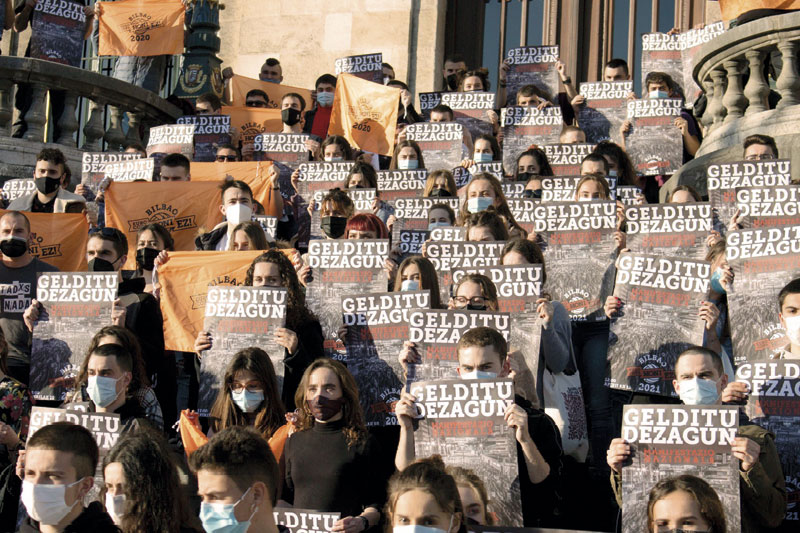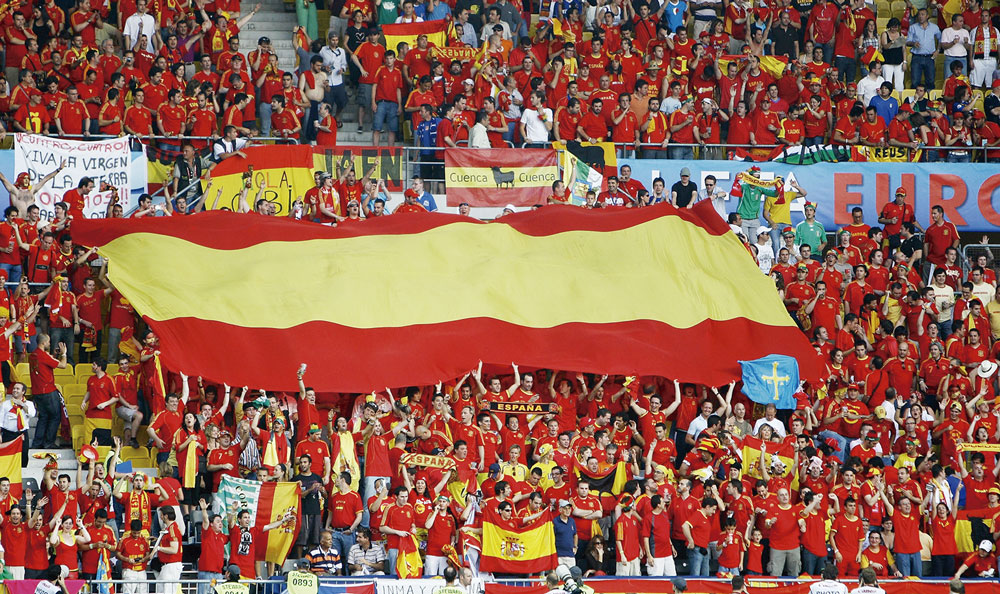More than football, both for and against
- Football, the sport of 22 people, passion, the source of inspiration or the “excuse to fill the stands with testosterone” are so many definitions that are assigned to the activity as points of view. But there are also ideas with a broad level of acceptance: football has become a round business for a few. Few people can deny it today.

Giant initiatives such as the European Championship are an example of this business that we have mentioned in the introduction. In addition to the trophy, there are millions of euros of profit at stake. Consequently, amid a pandemic situation, a large-scale geopolitical predatory competition has been unleashed to solve the tournament scenario. Since Bilbao is among the candidates, public institutions of the Basque Autonomous Community have also participated, as well as football associations and companies. However, not all that has emerged around the macro exercise has been a treasury. In our case, social movements have also emerged that have hung up the arguments to question the legitimacy of the project. Let us look at the main keys that the Euro Cup and its powders have raised.
To finalize the
The tournament was to be played in June 2020, in the football fields of several European countries, between San Mamés, where the Spanish team would play as a domestic team, but it was suspended on the occasion of COVID-19. Ahead of the year 2021, UEFA President Aleksander Ceferin launched the following warning in the Movistar+ news in full pandemic uncertainty: “I am convinced that the Euro Cup will be held in 2021.” When asked about the host countries, however, he did not give a clear answer: “They can be eleven, eight, five or one.” Nor did it expressly state that the conditions of access to stadiums must necessarily be guaranteed. In principle.
These words date back to last October, and since then the institutions have publicly kept the omerta around the Euro Cup. Coinciding with the new year, the European Football Federation UEFA has opened rumours about a single seat, which has led to a large number of positions. According to the newspaper Deia, at the end of February the City of Bilbao sent UEFA a “Study on the many scenarios planned to receive the Euro Cup”. Health authorities will value the organization with public, without public or limited public depending on the situation of COVID-19. For its part, UEFA, after receiving the reports of the public institutions that will try to present the right health conditions, will select at the April summit the capitals that will allow the tournament to be held in the “best conditions”, prioritizing, of course, the economic criteria. Compliance with the grade between 25% and 30% is a requirement. The City Council of Bilbao, in any case, has repeatedly defended the possibility of being a seat, as it has already invested EUR 1,300,000 in training in safety and mobility of the project. El Correo collected the words of the president of the Spanish Football Federation, Luis Rubiales, begging UEFA: “I’ve heard someone who [the Euro Cup] without a public is not profitable. The mere fact of having three parties and being a showcase to the world carries with it an intangible cost of millions of euros in advertising, even if the stands are empty”.

On February 18, the newspaper El Mundo announced that Rubiales acts with mastery in determining the economic outcome of sports activities, which received a complaint for alleged coercion, threats or administrative prevarication. In order to achieve the exploitation of audiovisual rights, he is accused of tightening the teams of the Iberdrola League.
Profitability committed
Various institutions are looking forward to the Euro Cup being played at all costs in Bilbao. Because, in view of the forecasts, in addition to Rubiales, the Councilor for Economic Development of the City Council of Bilbao, Xabier Ochandiano, recalled that the Euro Cup, which initially amounted to an expenditure of 5.5 million euros, was going to return “another 84 million”. All this would also “go to hotels, restaurants, shops and other shops”, according to Ochandiano. For their misfortune, the latter figure would be reduced if there was no public or if they reduced their capacity. Ceferin is clear about the importance of amateurs, even though the economic balance has been adorned with epic futbolera: “Fans make football as special, and that’s as true as any other championship in the Euro Cup. We have to give us as much leeway as possible in order to be able to return to the stadiums.”
“And also the race of snails if necessary”
Several states and their football associations try to seduce UEFA with the aim of collecting the share of profits. The good words on this road are invalid if countries are not able to present adequate infrastructures, "smooth" pandemic conditions or rigorous safety criteria. America TV highlighted the asymmetries between countries, with the forces and weaknesses of potential candidates. In fact, a UEFA option would be “one country EURO”, host Russia or Germany, insofar as the epidemiological conditions are somewhat better. The second hypothesis is that it will be held in a single capital with as many football fields as necessary to host the whole championship: In London, where there is a dangerous British variable of COVID-19. Lastly, there would be the “Euro Cup of the Twelve”, which is to a large extent hampered by restrictive mobility measures.
These are the requirements for the candidacy contest. In the meantime, the media in each country, football federations and institutions are desperately fighting to get some of the cake delivered to them. On February 1, the media El Independiente recalled the words of Alfonso Gil, spokesman and councillor of the PSE in Bilbao: “Do you know what the impact will be on the image of the city? We should organize any event and the world championship of the race of snails.” We would ask that the last word be that of UEFA, and although the decision has not been taken at the time of drafting these lines, it is clear what the priorities of the organisation are. If Bilbao is going to meet the criteria or not, there's the spoon.
Voluntary Israel
As in other major events of this kind, Israel has come forward to host the Euro Cup. This manoeuvre has at least two objectives: Hiding the massacre being perpetrated against the Palestinian people and showing to the international community that it is “the civilised country of Europe”, have denounced movements such as the BDS. In addition, the sports newspaper Marca has pointed out that of the 9 million citizens that Israel recognizes as citizens of its rule of law, 3.8 million have already received the COVID-19 vaccine. These figures are clearly higher than the European ones. If that were not enough, Israel has extended the possibility of playing the Champions League there, and UEFA tells it that it will appreciate the offer.
Looking for economic benefits
Returning to Euskal Herria, another significant actor jumps into the playing field of the Euro Cup storm: Euro Cup No platforms. As history is written outside the elegant offices, social movements have opted for the gigantic event.

The group was critical to know that the Vizcaine capital could receive the 2020 Euro Cup, and pointed out the reasons why it was opposed to it, such as “the increased exploitation of the working class, the denial of the official Basque selection, the increase in violence suffered by working women and the compliance of Euskal Herria with fascist and armed force”. When UEFA and the other institutions started to reorganize the project by 2021, Euro Cup Honi Ez denounced that “economic benefits over health”, “reducing political freedoms and criminalising society” have prevailed. Let us start the Stop Us campaign, and in this regard, on 10 April it launched a national call to mobilise in Bilbao. [Read here the chronicle of the manifestation]
A drone in San Mamés
On March 20, at the 68th minute of the match between Athletic and Eibar, a flying object landed in the green area of the San Mamés stadium, with the orange flag with the slogan No to this Bilbao 2020 Euro Cup. The device was a drone, a small, remotely piloted airplane. This action has had at least two consequences that those who want the tournament to be held in Bilbao will not see with good eyes. On the one hand, the critical demands of the Euro Cup Hau Ez have spread to the countryside and to the media around the world. On the other hand, it has questioned the stadium security protocol in the midst of the process of selecting Euro Cup capitals. All this shows us that, just as for the powerful Eurocups, it is more than football, for the members of the social movements it goes beyond sport, which have managed to become a space of opportunity for politicisation and a field of battle more.
UEFAk apirilaren hasieran erabakiko du Bilbo izango den Europako Futbol Txapelketa jasoko duen hirietako bat. Alegia, Espainiako selekzioak San Mamesen jokatuko ote duen. Horren aurrean, mobilizazio nazionala deitu du Eurocopa Honi Ez ekimenak, apirilaren 10ean Bilbon.
The Spanish men’s football team, for the first time since 1967 in the Basque Country, will play three Euro 2020 matches at the stadium in San Mamés. “In 2014 we presented the candidature of the City of Bilbao, the Provincial Council of Bizkaia and the Basque Government,... [+]



















